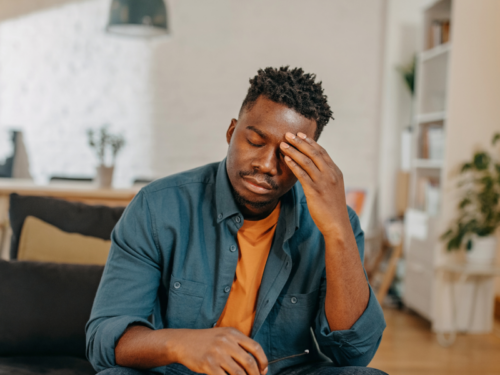
Table of Contents
Who to Call for a Mental Health Crisis Instead of the Police

Written By: Alex Bachert, MPH

Clinically Reviewed By: Meghan Jensen
July 10, 2024
6 min.
Before you contact the police, consider these mental health-specific resources for managing mental or behavioral health crises.
Learn more about our Clinical Review Process
Table of Contents
If you’re experiencing suicidal thoughts or are in danger of harming yourself, this is a mental health emergency. Contact The Suicide & Crisis Lifeline 24/7 by calling or texting 988.
Law enforcement and the carceral system have increasingly become the nation’s go-to for addressing mental health emergencies. Data shows that U.S. state prisons and county jails hold ten times more people with serious mental health conditions than state mental hospitals, and as many as 20% of incarcerated Americans have a serious mental illness. Although increasingly common, when police respond to mental health crises, people don’t always get the care they need. About 1 in 5 people killed by police since 2015 were experiencing a mental health crisis, according to national reporting.
While there’s no simple solution for solving this national public health issue, it does invite room for thought on how to handle mental health crises better. One idea is to make sure people understand what crisis intervention services are available during moments of crisis. Below, experts explore how to respond to a mental health crisis without calling the police, as well as mental health resources to contact during a crisis instead of the police.

We offer clients mental health crisis support
Virtual intensive therapy with 24/7 wraparound care.
Who to call for a mental health crisis instead of the police
Research suggests that a substantial amount of 911 calls relate to mental and behavioral health issues, yet very few of these calls result in people getting access to the mental healthcare that they need. Here are several alternatives to consider next time you or a loved one experience a mental health crisis.
1. Assess the situation
According to the National Alliance on Mental Illness (NAMI), the first step in managing a mental health crisis is to assess the situation. A few questions to ask yourself include:
- Is the person in danger of hurting themselves or others?
- Do they need emergency medical support?
- Do I have time to call their medical or mental health provider?
Depending on the situation, you may be able to de-escalate by keeping your voice calm, asking how you can help, and listening to the other person’s concerns and requests.
2. Get in touch with their care team
If the mental health crisis doesn’t pose any immediate danger, you can reach out to someone who is familiar with that person’s health history. This might be a mental health provider (like a psychiatrist, therapist, nurse, social worker, or case manager) or a medical provider, like a primary care physician. With the help of this health professional, you can employ established coping methods, make an outpatient appointment, or contact crisis services if the situation is worsening.
3. Contact emergency support resources
If someone is experiencing a mental health crisis that requires immediate support, it’s best to contact crisis intervention services. According to Kathleen Douglass, MA, LCPC, Charlie Health Clinical Supervisor, “stabilization services are focused on support, safety, medication management, and teaching coping skills.” They’re used until the “crisis is averted and the person is able to function, care for themselves again, and continue working in an outpatient setting,” she says. It’s important to note that some emergency support resources might contact the police if a person is a danger to themselves or others.
1. 24-hour crisis lines
The Suicide & Crisis Lifeline is a national network of local crisis centers that offer free and confidential support to people in suicidal crisis or emotional distress. Whether you’re contemplating suicide, experiencing symptoms of depression, or simply need someone to listen, crisis counselors are available for 24/7 support. Contact The Suicide & Crisis Lifeline by calling or texting 988. You can also find a suicide prevention and crisis center in your state here.
2. Mobile crisis teams
A mobile crisis team is a group of mental health professionals who are responsible for responding to mental health emergencies that occur outside of a hospital or clinical setting. The goal is to connect people with immediate, on-site care that allows them to stay in their community and out of a hospital or police setting.
“Crisis stabilization services vary by geographical area,” says Douglass. “Some areas have something called the mobile crisis team, who will come to your home and provide you with support and an evaluation to see if intensive services are required.” You can search online to see if your town or city has mobile crisis team resources.
3. Intensive outpatient programs (IOPs)
Charlie Health’s virtual intensive outpatient program (IOP) provides clients with 24/7 crisis services to ensure people’s safety and well-being. The Crisis Services Team includes trained care coaches, crisis managers, and therapists who have experience delivering emergency services with compassion and care. Through multiple weekly sessions, people learn to build healthy coping skills and manage their condition while maintaining their daily routine.
Four tips for working with police during a mental health crisis
When law enforcement responds to a 911 call, they’ll have the final say on how to manage the situation. In some cases, that may involve referring the person for a mental health evaluation, treatment, or even arrest. Here are four expert-approved tips for working with police to navigate a mental health crisis in a way that prioritizes a person’s health, safety, and well-being.
- Explain that the 911 call is for someone who is experiencing a mental health crisis and is not a criminal. Mention if the person has no history of violence or criminal acts.
- Share any relevant information, such as mental health issues, history of substance abuse, and current medications.
- Help keep the situation calm and controlled by remaining calm yourself. The responding police officer is in charge of how to proceed, but being objective and efficient may help guide the decision.
- Once law enforcement leaves, contact a friend, healthcare professional, or mental health advocate for support and advice on how to follow up.

How to prepare for a mental health crisis
A mental health crisis refers to any situation where a person’s mental well-being is severely compromised. Common examples of mental health crises include:
- Intense feelings of hopelessness, despair, or suicidal thoughts
- Severe anxiety or panic attacks
- Inability to take care of oneself or perform daily activities
- Extreme mood swings or emotional instability
Mental health crises can be sudden and debilitating, so it’s helpful to know how to best handle them. One way to manage a mental health crisis without calling 911 is to create a mental health emergency plan. This is a personalized resource designed to help people and their support networks quickly and efficiently respond to mental health crises. The goal is to minimize risk while ensuring access to appropriate mental health care during critical moments. An emergency response plan typically includes emergency contact information, medical conditions, and details about current medications. It may also include crisis hotline information, as well as safe locations for accessing support.

Manage a mental health crisis with Charlie Health
If you or a loved one require immediate mental health support, Charlie Health may be able to help. Charlie Health’s virtual Intensive Outpatient Program (IOP) provides more than once-weekly mental health treatment for young people and families dealing with serious mental health conditions with no waitlists in most states. Our expert clinicians incorporate evidence-based therapies into individual counseling, family therapy, and group sessions to help you manage mental health symptoms and improve your quality of life. With this kind of holistic treatment, it’s possible to sustainably manage serious mental health issues. Fill out the form below or give us a call to start healing today.




